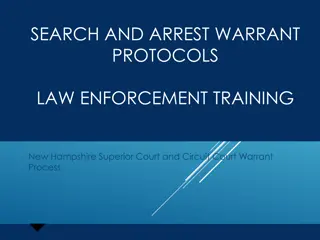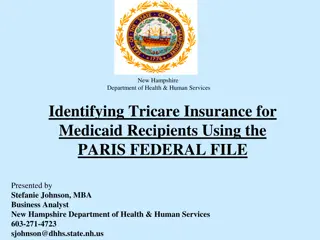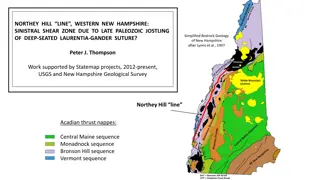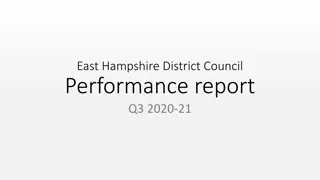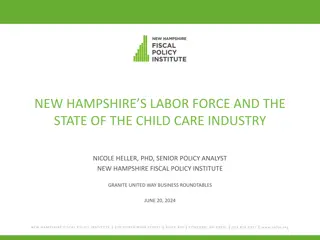Legal Challenges in New Hampshire Education Funding
In the ConVal case, there are issues regarding the adequacy of base funding and the violation of the NH Constitution. Various court cases and opinions highlight the state's obligation to fund education adequately without passing the burden to local communities.
Download Presentation

Please find below an Image/Link to download the presentation.
The content on the website is provided AS IS for your information and personal use only. It may not be sold, licensed, or shared on other websites without obtaining consent from the author.If you encounter any issues during the download, it is possible that the publisher has removed the file from their server.
You are allowed to download the files provided on this website for personal or commercial use, subject to the condition that they are used lawfully. All files are the property of their respective owners.
The content on the website is provided AS IS for your information and personal use only. It may not be sold, licensed, or shared on other websites without obtaining consent from the author.
E N D
Presentation Transcript
ConVal et al v. State Michael J. Tierney, Esq. Wadleigh, Starr & Peters, PLLC 95 Market Street Manchester, NH 03101 mtierney@wadleighlaw.com
Base adequacy funding is inadequate in violation of Part II, Article 83 of the NH Constitution 2 issues in the ConVal Case: Requiring disproportionate local property taxes to fund State s educational obligation violates Part II, Article 5 of the NH Constitution
1.Why bring the ConVal case in March 2019? 2.What happened at the Superior Court? 3.What is being argued at the Supreme Court?
Claremont Sch. Dist., 138 N.H. 183 (1993) (Claremont I) Claremont School Dist., 142 N.H. 462 (1997) (Claremont II) Claremont Sch. Dist. (Motion to Vacate), 142 N.H. 737 (1998) Opinion of the Justices, 142 N.H. 892 (1998) Claremont Sch. Dist. (Extension of Deadlines), 143 N.H. 154 (1998) Claremont Sch. Dist. (Statewide Tax Phase In), 144 N.H. 210 (1999) Claremont Sch. Dist. v. Governor (Attorney's Fees), 144 N.H. 590 (1999) Opinion of the Justices (Reformed School Financing), 145 N.H. 474 (2000) Claremont Sch. Dist. v. Governor, 147 N.H. 499 (2002) Londonderry Sch. Dist. SAU No. 12, 154 N.H. 153 (2006) Londonderry Sch. Dist. SAU #12 v. State, 157 N.H. 734 (2008) ConVal, Winchester et al v. State, ******(2020)
Claremont Sch. Dist. v. Governor, 142 N.H. 462, 473 (1997). [I]n this State a constitutionally adequate public education is a fundamental right. . . .[and] the fundamental right at issue is the right to a State funded constitutionally adequate public education.
Opinion of the Justices (Reformed Public School Financing System), 145 N.H. 474, 476 (2000). The State [has] the exclusive obligation to fund a constitutionally adequate education. The State may not shift any of the constitutional responsibility to local communities.
None of that financial obligation can be shifted to local school districts, regardless of their relative wealth or need. Londonderry School District v. State 154 N.H. at 162 (2006)
The State is funding base adequacy of just $3,636.06 for the 2019 fiscal year. Local Taxpayers Are Funding the State s Obligation For the 2020 and 2021 fiscal years, the base adequacy aid will be $3,708.78 No school district is able to educate a child at less than $12,000 per pupil
HB678 (2019) proposed to increase base adequacy to $9,929 exclusive of transportation Not adopted, but used as a model of minimum funding March 13, 2019 ConVal files case March 20, 2019 Hearing on Request for Preliminary Injunction Use 2008 Costing framework Correct the 5 most egregious errors Fund ConVal at $9,929 per pupil by April 1 final payment deadline Background
Five Errors with 2008 Costing Formula Student Teacher Ratio Teacher Benefits Facilities Cost Superintendent, Nurse, Food Services Transportation
Superior Courts Rulings of June 5, 2019 The State failed to prove it was providing constitutionally adequate funding to petitioner school districts because: no rational basis for using maximum classroom size as teacher student ratio facilities costing at only 8% of actual expenses is unconstitutionally arbitrary no rational basis for excluding transportation aid for high school students
Superior Courts Reconsideration Order of July 26, 2019 1) distribute transportation aid at the same amount for each district due to up to 600% difference in transportation costs between districts School districts asked Court to order State not to unconstitutionally 2) different school districts, it is not beyond question that the Legislature may fund transportation at a uniform, per-pupil rate that is so high that it would satisfy the transportation costs in a district with even the most expensive transportation costs. In such a case, transportation would be sufficiently (and overly) funded in every school district even without consideration of varying costs between them. Superior Court held that even with varying transportation costs in
Supreme Court Appeal filed by State on September 6, 2019 State filed its brief on February 18, 2020 State does NOT allege that it fully funding an adequate education State argues that Court should not have considered the data that the State Department of Education publishes as the State has not verified the accuracy of this data
Schools File Cross Appeal Superior Court was correct to hold funding constitutionally inadequate But Superior Court erred in not ordering a specific remedy And Superior Court erred in not addressing disproportionate taxation
In addition to Part II, Article 83 violation, State is violating Part II, Article 5 as well In 1999, the Statewide Education Property Tax (SWEPT) (RSA 76:3) was originally adopted at a uniform rate of $6.60 per thousand. See N.H. Laws 1999, 17:14; Claremont Sch. Dist. v. Governor, 144 N.H. 210, 213 (1999). Twenty years later, SWEPT s rate has been decreased to $2.17 per thousand, less than one third of its original rate.
Troy has a combined tax rate of $21.52., while the community of Newington has a total education tax rate of $3.19. This is a difference of approximately 675%. Disproportionate Tax Rates to Fund State s Educational Obligation Winchester has a combined local and state education tax rate of $22.65. Compared to Newington, this is a difference of approximately 710%.
Turn it over to John Tobin to talk about taxes...






